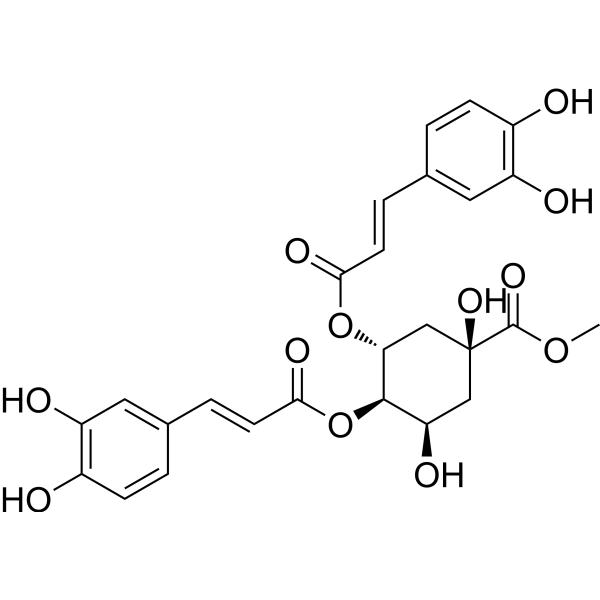
3,4-Di-O-caffeoylquinic acid methyl ester
CAS No. 114637-83-1
3,4-Di-O-caffeoylquinic acid methyl ester( —— )
Catalog No. M31469 CAS No. 114637-83-1
3,4-Di-O-caffeoylquinic acid methyl ester shows high efficiency and low toxicity with antivirus activity against RSV; it exhibits cytotoxicity actions against human cervix carcinoma HeLa cells.
Purity : >98% (HPLC)
 COA
COA
 Datasheet
Datasheet
 HNMR
HNMR
 HPLC
HPLC
 MSDS
MSDS
 Handing Instructions
Handing Instructions
| Size | Price / USD | Stock | Quantity |
| 5MG | 379 | In Stock |


|
| 50MG | Get Quote | In Stock |


|
| 100MG | Get Quote | In Stock |


|
Biological Information
-
Product Name3,4-Di-O-caffeoylquinic acid methyl ester
-
NoteResearch use only, not for human use.
-
Brief Description3,4-Di-O-caffeoylquinic acid methyl ester shows high efficiency and low toxicity with antivirus activity against RSV; it exhibits cytotoxicity actions against human cervix carcinoma HeLa cells.
-
Description3,4-Di-O-caffeoylquinic acid methyl ester shows high efficiency and low toxicity with antivirus activity against RSV; it exhibits cytotoxicity actions against human cervix carcinoma HeLa cells.
-
In Vitro——
-
In Vivo——
-
Synonyms——
-
PathwayOthers
-
TargetOther Targets
-
Recptor——
-
Research Area——
-
Indication——
Chemical Information
-
CAS Number114637-83-1
-
Formula Weight530.5
-
Molecular FormulaC26H26O12
-
Purity>98% (HPLC)
-
Solubility——
-
SMILES——
-
Chemical Name——
Shipping & Storage Information
-
Storage(-20℃)
-
ShippingWith Ice Pack
-
Stability≥ 2 years
Reference



-
Sappanone A
Sappanone A is the first homoisoflavanone to be discovered with melanogenesis inhibitory activity. It exerts its anti-inflammatory effect by modulating the Nrf2 and NF-?oB pathways, and may be a valuable compound to prevent or treat inflammatory diseases.
-
[Lys4] Sarafotoxin S...
[Lys4] Sarafotoxin S6c
-
Neuropeptide W-30 (h...
Neuropeptide W-30 (human) is an important stress mediator in the central nervous system that modulates the hypothalamus-pituitary-adrenal (HPA) axis and sympathetic outflow. Neuropeptide W-30 (human) is an endogenous ligand for the two structurally related orphan G-protein-coupled receptors (GPCRs) GPR7 and GPR8. Neuropeptide W-30 (human)activates and binds to both GPR7 and GPR8 at similar effective doses.



 Cart
Cart
 sales@molnova.com
sales@molnova.com


